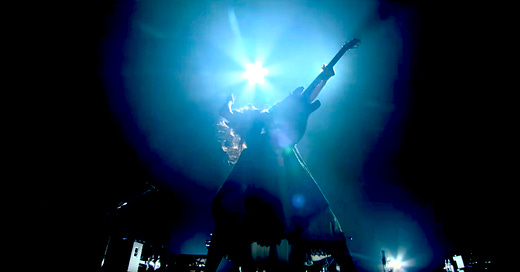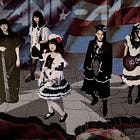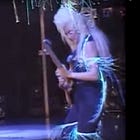“You play good for a girl.” How many women have had to put up with condescending crap like that? Raise your hands…
I start this year’s IWW series with an old favorite, an all-female band that has thoroughly mastered hard rock. They don’t just play “good for girls”; they play better than 99% of the dudes. This is a big deal from a music history perspective because the music establishment has never supported women playing rock.
Here are some previous articles I posted on them in connection with their U.S. tours:
*****
If you had stopped the clock around 1980, you would have been justified in thinking that women were well on their way to claiming a significant share of the rock scene.
Many women had broken through and were not only keeping up with the boys but, in some cases, were taking charge:
Janis Joplin, Suzi Quatro, Joan Jett, Lita Forde, Tina Turner, Chrissie Hynde, Pat Benatar, Nancy Wilson, Debbie Harry, and Patti Smith were major stars. This was when rock music was the dominant form of popular music, not only in the U.K. and U.S., where it had been invented but in much of the world.
And then, the revolution didn’t happen. Why? Women have broken through in so many other fields. For starters, in the U.S., girls dominate academics — over 70% of high school valedictorians are girls, a pattern that has held for at least 20 years, and over 60% of graduates from most colleges are women.
Women have significantly increased their presence in the professional workplace, from business to politics to highly specialized fields like biotechnology, where they dominate now. Women compete in sports previously reserved for men and, in some cases, outshine the men (see the U.S. National Women’s Soccer Team, for example).
There remain troubling disparities in some fields, like engineering and the corporate boardroom, but even there, we see signs of progress. Recently, we have entered a political moment in which the country’s leaders seem bent on turning the clock back for women, but short of going full police state, it seems unlikely they will be able to undo all of the progress.
Why, then, are women so invisible in rock music? The answer to this question is an important signifier of deep cultural assumptions we take for granted.
It’s not that women haven’t broken through in popular music overall. Today's American pop charts are dominated by women, which is an obvious sign of progress (hip-hop is a glaring exception, though even that appears to be changing).
Their domination, however, is based on a narrow platform: All the big names are singers—few play any instruments, and, with rare exceptions, when they do, they do not play rock.
This is an important distinction. The image of the singer-songwriter, strumming an acoustic guitar while crooning about love or heartbreak (think of Joni Mitchell), is a staple of popular music. But in the U.S., a woman who picks up an electric guitar is seen as transgressive or dismissed as a curiosity. We still have a problem with women who kick ass.
I’ve written about some of the exceptions--examples include Gail Ann Dorsey:
and Jennifer Batten:
I hope you’ll check them out. But they are a relative rarity, at least here in the home of rock ‘n roll.
Go overseas, and the story is different. Rock and roll “girl bands” are exploding all over the place.
Band-Maid are approaching the 12th anniversary of their founding. It’s an unlikely story featuring a failed idol singer with outsized ambitions and a crew of eccentric but enormously talented musicians who found each other by word of mouth.
The founder, putting ego aside when she realized her voice was not powerful enough to carry them, recruited a lead vocalist and committed herself to learning to play the guitar so she would still have a job (try to imagine an American pop star doing that!)
They nearly called it quits a year into their existence when their label had decided to pull the plug. Unknown to them, their final published work, a music video that was the “B” side to their last official single, went viral in the U.S. and Europe. They only figured it out when their social media exploded.
If you have never seen it, here is that video. They call the discrepancy between their look and their music “the Gap”, and the shock value is meant to skewer the stereotype of women being meek and submissive. I’d say it works.
Their label decided to give them another shot. They took off and have never looked back.
As good as their studio work is, they are first and foremost a live band. That is a good thing in a world where recorded music barely pays musicians anything, and one makes a living touring and selling merchandise. Having seen them live three times, I have no problem saying they can stand with any of the great bands I’ve seen, and that is a long list.
But see for yourself. This was just posted two weeks ago. Watching them develop from the band that did “Thrill” into this juggernaut has been, well, a thrill. Oh, and in light of my recent post about bassists, pay attention to the bassist, Misa. She is one of the best I’ve ever seen.
More to come! If you want to be notified of the next chapter, subscribe here:









Well needless to say, any mention of Band Maid means I will share this around. I have bored enough people by my admiration for this band and what they have achieved. Asian Rock and Pop have made music fun and inspirational. From recorded to live performances. All female bands lead the way and any chance to see great musicians play with a beaming smile on their face is a reminder of what music should be about.
First that I've heard "Shambles." They must be great in concert. Every one of them fantastic, including Misa!